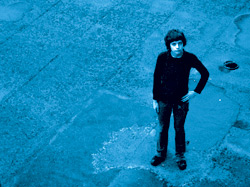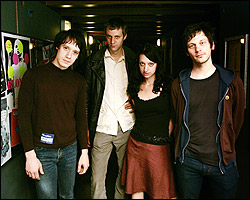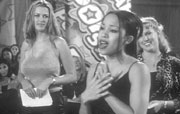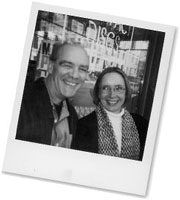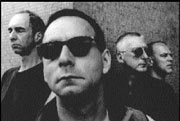Seattle Weekly: You’re a solo singer/ songwriter and guitar player who goes by the name Tiny Vipers. How does using that name change the point of view of the music?
Jesy Fortino: I guess going by another name keeps a necessary distance between [me] and people who listen to my music. Though my songs are abstract, they are extremely personal. Performing under another name creates a sort of fiction for me to be a part of, rather than me taking myself apart in front of a bunch of strangers.
Most of your songs are very sparse; single guitar notes are plucked and picked, and oftentimes those notes are more rhythmic than melodic. Your vocal melodies and these intricate, long-winded stories carry the songs. Do you tend to write music first and then lyrics, or is it the other way?
I tend to write all the music at once. I’ll play something on the guitar that I feel I can wrap a vocal melody around, and I modify the guitar to the vocal so the two parts are constantly interacting with each other. Sometimes it takes me a couple days to write a song; sometimes it takes me years.
There is also plenty of mysticism and legend in your songs, which gives them an old, folk song–like quality, which is interesting to hear via an MP3 posted on MySpace. Which world are you more comfortable in, the old one or the new one?
I am sure I would be faced with the same feelings of fulfillment or frustration in the old world as I [am] in the new. I do not dislike technology, but I don’t praise it either. I feel like technology has given humanity new, incredible ways to make [ourselves] more comfortable, but I also believe it has robbed us of mystery. The task of fantastic creatures and places was to give meaning to each human characteristic and to guard what is sacred. When you thought there were huge monsters protecting passage across the ocean, it made you think and rethink why you were doing it and whether it was worth it. The presence of spirits and superstition was to make people constantly aware of a world that was much larger than human affairs.
At the end of one of the songs on your self-made CD-R release, a fade-out bleeds into a radio clip of someone discussing Ross Perot. Do you consider yourself a political artist?
Actually, I recorded those songs in my last apartment, and for some reason my eight-track was picking up mad radio waves. I do not consider myself a political artist. I feel like weaving my political ideas into my songs would be manipulative. I try to describe what it feels like to be human in this time.
